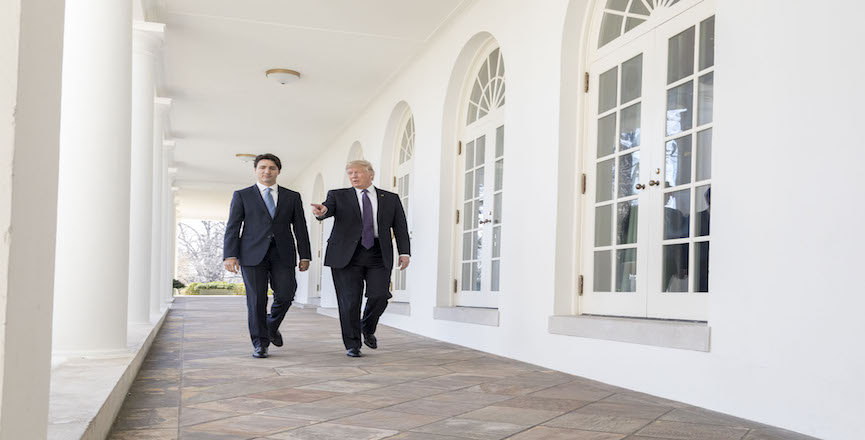In mid-August, just before the first round of NAFTA talks, the CBC reported that the Trudeau government’s demands for NAFTA 2.0 were:
- Maintaining [the Chapter 19] process to regulate anti-dumping and countervailing disputes
- Reforms to the investor-state dispute settlement process
- Expand procurement
- A new chapter on labour standards
- Protect Canada’s supply-management system for dairy and poultry
- A new chapter on environmental standards
- A new chapter on gender rights
- A new chapter on Indigenous rights
- Freer movement of professionals
- Protect cultural exemptions
Trudeau’s demands appear to be going nowhere, given various news sources have reported over the past days and weeks that:
- The Trump administration wants all of Chapter 19, which governs dispute panels that Canada has successfully used to challenge American tariffs on softwood lumber, to be simply struck from the agreement.
- The administration says that countries should be allowed to opt out of Chapter 11 dispute-resolution panels, which allow corporations to sue governments for political decisions that hurt their business.
- It has demanded that Canada and Mexico be barred from receiving any more in government contracts, dollar-for-dollar, than American companies receive in those two countries.
- It has rejected Canada’s call for an end to right-to-work laws in 28 U.S. states. Trump also opposes raising the federal minimum wage in the U.S. from the current $7.25 per hour to $15 per hour.
- Trump backs the U.S. dairy lobby’s demand for the elimination of Canada’s supply management system.
- Given the United States has submitted its formal notice to withdraw from the United Nations climate agreement reached in Paris, the U.S. unlikely to agree to an environment chapter in NAFTA.
- Former U.S. trade negotiator Wendy Cutler says the Trump administration would only support a chapter on gender inequality if it was aspirational, had only soft commitments, and was not enforceable.
- Given Trump has violated the United Nations Declaration on the Rights of Indigenous Peoples with the approval of the Keystone XL and Dakota Access pipelines, it’s unlikely he would support a meaningful Indigenous rights chapter in NAFTA.
- Former U.S. Deputy Trade Representative Robert Holleyman says any changes to labour mobility could prove difficult and would likely get swept into the turbulent U.S. immigration debate.
- Even a Democratic Congressman on the powerful House Committee on Ways and Means (recently lobbied by Trudeau) has called on Canada to loosen its protections for cultural industries, exempted from the current NAFTA.
It has also been reported that the Trump administration has demanded that:
- Vehicles made in Canada and Mexico contain at least 50-per-cent U.S. content in order to qualify for duty-free shipment throughout the NAFTA zone, a requirement that would not apply to vehicles made in the United States, while North American content in all NAFTA zone autos would rise from 62.5 per cent to 85 per cent and every component of a vehicle — down to the steel — would count toward that total.
- Chapter 20 panels, which adjudicate trade disputes between governments, be demoted to an advisory role, allowing a losing country to disregard their decisions and retaliate against the other country.
- A 12-year patent-style protection for cutting-edge biologics medicines be implemented that would drive up drug prices in Canada.
Furthermore, it does not appear that two of our key demands have been discussed (or would be seriously considered by either Trudeau or Trump), namely: removing references to water as a tradable good, service and investment, and eliminating the energy proportionality provision (if anything, it’s more likely that Mexico could be brought under this provision that undermines action to address climate change).
After the fourth round of talks conclude today, it is expected that, should the talks not collapse, that:
- Round five: October 29 through November 2 in Mexico
- Round six: November 16 through November 21 in Canada
- Round seven: December 6 through December 10 in the United States
The Daily Mail is now reporting,
“Officials are also starting to look at possible dates for extra rounds early next year. The three nations initially set an end-December deadline, citing the need to avoid a Mexican presidential election [on July 1, 2018]. Privately, officials now say that if the negotiations need to be extended, they could run till the end of February without causing too many problems.”
The likely outcome of these talks? This weekend, Unifor president Jerry Dias tweeted, “As round 4 talks continue I believe it’s time to prepare for a period of trade without NAFTA. It seems America wants negotiations to fail.”
And in The Globe and Mail this morning, KPMG’s global chairman of consumer markets Willy Kruh writes, “Seven in 10 [Canadian business leaders] believe there will be major changes to the deal and 40 per cent think it’s somewhat likely the United States will terminate NAFTA altogether.”
Brent Patterson is the Political Director of The Council of Canadians.
This post originally appeared on Brent Patterson’s blog.
Image: Foreign Leader Visits/Wikimedia Commons
Chip in to keep stories like these coming.




